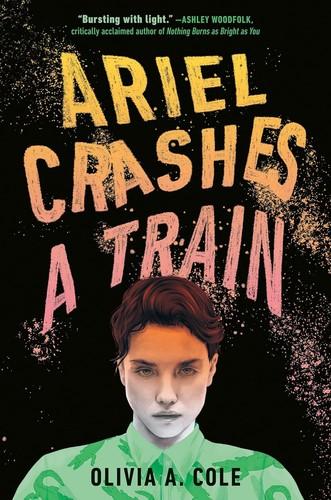Cole, Olivia A.
3 Reviews
(2)
YA
Seventeen-year-old Ariel Burns is struggling with constant, anxious "what-if" thoughts and dark, violent "crocodile in my mind" fantasies that have escalated to an obsessive degree. She resorts to extreme, repetitive actions such as walking in circles sixty-four times to keep those awful thoughts at bay. With her beloved older sister away at college, her parents emotionally distant, and her best friend gone for the summer, Ariel is having difficulty separating fantasy from reality and worries that she is a danger to others. The support of new friends and texts from her sister help her to begin to confront those concerns. Cole explores the parallel stories of Ariel's inner and outer realities through compelling free verse and illuminating juxtaposition of inner monologue and external events. Questions of gender identity are interwoven as Ariel wonders what it means to be a "girl" when you're 5'11" and wear a size twelve shoe. "I am too many things, all of them / too. / Too big / Too quiet / Too broad / Too off." This powerful novel in verse provides an intimate look at the patterns of obsessive-compulsive disorder and offers an opportunity to explore the ways our inner voices affect our behavior and self-concept. Mental health resources are appended.
(2)
4-6
Henry Lightfoot has always been the "earthworm" to her father's "social butterfly," more interested in making art at home than joining him on far-reaching adventures. But after he wanders out of Quinvandel Forest on her twelfth birthday -- the same forest into which he'd disappeared exactly one year earlier -- she ventures into the woods to determine where he had been and prove her bravery. Henry quickly finds herself in a Neverland-like realm referred to as simply "This Place" by its inhabitants, who are all lost beings trying to find their way back. Cole revels in developing the delightfully arbitrary rules of This Place (e.g., no one needs food to survive, and a native berry makes human-animal communication possible). Meanwhile, equally strange yet increasingly sinister occurrences are indicative of a new mysterious instability to which Henry, along with fellow lost children Wolfson and Ndidi, must discover a solution. "Home is the best North Star," writes Henry's father, a man whose initial charm Cole gradually complicates, causing Henry to acknowledge his more callous traits. Home may be no paradise for Henry, Wolfson, or Ndidi, but Cole contends that only through embracing where they are from -- and who they resolve to become -- will they find guidance, safety, and healing from literal and figurative loss.
Reviewer: Ed Spicer
| Horn Book Magazine Issue:
January, 2025
(2)
YA
For troubled sixteen-year-old Alicia, the past year has been one of betrayal (she was cut out of her best friend's life "like a tumor"), parental divorce and dysfunction, and social isolation and slut-shaming. Sexual assault by a revered teacher has thrown her into a personal and academic tailspin, leaving her enraged and disillusioned with the adult world. Only through connections with new friends and with a girls' discussion group is Alicia able to see beyond her psychic pain and forge a stronger, healthier sense of self. Racial and cultural awareness (Alicia is white; new friend Deja is Black; another new friend, Geneva, is Pakistani and white) and the highlighting of multiple forms of sexuality and the power of women supporting women help broaden the story's scope beyond its indictment of pervasive predatory male behavior. Alicia's visceral first-person free-verse narrative, full of acerbic and angry barbs, makes for difficult reading at times. Readers are privy to all that she is processing, including her destructive choices and her inability to ask for the support she needs. Interspersed letters to the mythological Medusa express Alicia's modern-day emotions: "A woman doesn't get... / so mad that her hair turns to snakes / so mad that her rage turns blood to boulder / so mad that she withdraws into a cave and dares the world to follow / all on her own." Being able to sit down with compassionate peers and talk about things makes a world of difference.
Reviewer: Luann Toth
| Horn Book Magazine Issue:
May, 2023
3 reviews
We are currently offering this content for free. Sign up now to activate your personal profile, where you can save articles for future viewing.






